Economy
Feds spend $3 million to fly 182 politicians and bureaucrats to climate conference
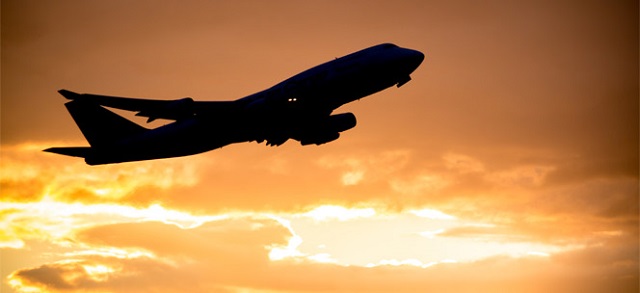
From the Canadian Taxpayers Federation
Author: Ryan Thorpe
Feds trip to COP28 in Dubai cost $3 million
The cost for Canada to send hundreds of people to COP28 in Dubai has doubled, rising to nearly $3 million, according to government records obtained by the Canadian Taxpayers Federation.
Included in those costs is $1.3 million the federal government dished out to host a “Canada Pavilion” at the summit, which featured a rapper performing a song on “climate disinformation,” while giving a shoutout to Environment Minister Steven Guilbeault.
“Nothing screams fighting climate change like flying around the world burning through jet fuel and millions of tax dollars,” said Franco Terrazzano, CTF Federal Director. “Here’s a crazy idea: maybe the feds don’t need to spend $3 million flying 182 politicians and bureaucrats to Dubai.”
The federal government paid for at least 182 people to go to COP28, held from Nov. 30 to Dec. 12, 2023, in Dubai, United Arab Emirates.
A previous report from the National Post pegged the cost for Canada’s delegation at $1.4 million.
But the bill now sits at $2,954,188, including $825,466 for transportation, $472,570 for accommodations and $295,455 for meals and incidentals, according to the records.
The records indicate the cost could rise even higher, as certain invoices and travel claims “have yet to be processed.”
Costs included $1.3 million for a “Canada Pavilion” to “showcase the breadth of Canadian climate leadership.”
At the Canada Pavilion, a Canadian rapper known as Baba Brinkman – the son of Liberal MP Joyce Murray – performed a rap on “climate disinformation.”
“Climate disinformation, get that immunization, the vaccine for bad meme infiltration,” Brinkman rapped. “Climate misinformation, it leads to polarization, which leads to radical conspiracy ideation.”
Environment Minister Steven Guilbeault also received a shoutout during Brinkman’s rap.
“Really? Hosting a rapper half-way around the world to drop rhymes at a government podium will help the environment?” Terrazzano said.
The records were released in response to an order paper question from Conservative MP Dan Mazier (Dauphin-Swan River-Neepawa).
Most of the hotel expenses came from the Dubai Marriott and the Premier Inn at the Dubai Investment Park, with rooms coming in between $150 and $400 per night.
The most expensive digs was a $816-per-night suite at the Pullman Dubai Jumeriah Lakes Towers, a “five-star hotel offering upscale accommodations.”
The Canadian delegation also handed out $650 worth of gifts during the trip.
Business
Trans Mountain executive says it’s time to fix the system, expand access, and think like a nation builder

Mike Davies calls for ambition and reform to build a stronger Canada
A shift in ambition
A year after the Trans Mountain Expansion Project came into service, Mike Davies, Senior Director of Marine Development at Trans Mountain, told the B.C. Business Summit 2025 that the project’s success should mark the beginning of a new national mindset — one defined by ambition, reform, and nation building.
“It took fifteen years to get this version of the project built,” Davies said. “During that time, Canadian producers lost about $50 billion in value because they were selling into a discounted market. We have some of the world’s largest reserves of oil and gas, but we can only trade with one other country. That’s unusual.”
With the expansion now in operation, that imbalance is shifting. “The differential on Canadian oil has narrowed by about $13 billion,” he said. “That’s value that used to be extracted by the United States and now stays in Canada — supporting healthcare, reconciliation, and energy transformation. About $5 billion of that is in royalties and taxes. It’s meaningful for us as a society.”
Davies rejected the notion that Trans Mountain was a public subsidy. “The federal government lent its balance sheet so that nation-building infrastructure could get built,” he said. “In our first full year of operation, we’ll return more than $1.3 billion to the federal government, rising toward $2 billion annually as cleanup work wraps up.”
At the Westridge Marine Terminal, shipments have increased from one tanker a week to nearly one a day, with more than half heading to Asia. “California remains an important market,” Davies said, “but diversification is finally happening — and it’s vital to our long-term prosperity.”
Fixing the system to move forward
Davies said this moment of success should prompt a broader rethinking of how Canada approaches resource development. “We’re positioned to take advantage of this moment,” he said. “Public attitudes are shifting. Canadians increasingly recognize that our natural resource advantages are a strength, not a liability. The question now is whether governments can seize it — and whether we’ll see that reflected in policy.”
He argued that governments have come to view regulation as a “free good,” without acknowledging its economic consequences. “Over the past decade, we’ve seen policy focus almost exclusively on environmental and reconciliation objectives,” he said. “Those are vital, but the public interest extends well beyond that — to include security, economic welfare, the rule of law, transparency, and democratic participation.”
Davies said good policy should not need to be bypassed to get projects built. “I applaud the creation of a Major Projects Office, but it’s a disgrace that we have to end run the system,” he said. “We need to fix it.”
He called for “deep, long-term reform” to restore scalability and investment confidence. “Linear infrastructure like pipelines requires billions in at-risk capital before a single certificate is issued,” he said. “Canada has a process for everything — we’re a responsible country — but it doesn’t scale for nation-building projects.”
Regulatory reform, he added, must go hand in hand with advancing economic reconciliation. “The challenge of our generation is shifting Indigenous communities from dependence to participation,” he said. “That means real ownership, partnership, and revenue opportunities.”
Davies urged renewed cooperation between Alberta and British Columbia, calling for “interprovincial harmony” on West Coast access. “I’d like to see Alberta see B.C. as part of its constituency,” he said. “And I’d like to see B.C. recognize the need for access.”
He summarized the path forward in plain terms: “We need to stem the exit of capital, create an environment that attracts investment, simplify approvals to one major process, and move decisions from the courts to clear legislation. If we do that, we can finally move from being a market hostage to being a competitor — and a nation builder.”
Business
Canada is still paying the price for Trudeau’s fiscal delusions
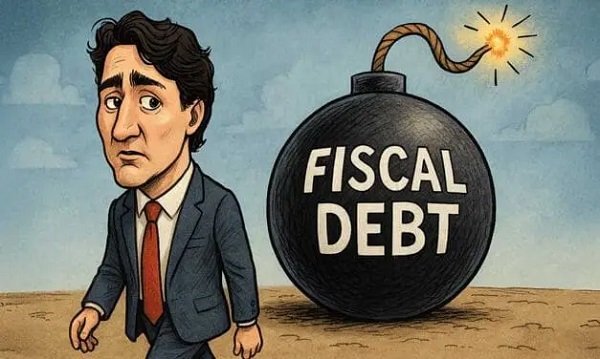
This article supplied by Troy Media.
 By Lee Harding
By Lee Harding
Trudeau’s reckless spending has left Canadians with record debt, poorer services and no path back to a balanced budget
Justin Trudeau may be gone, but the economic consequences of his fiscal approach—chronic deficits, rising debt costs and stagnating growth—are still weighing heavily on Canada
Before becoming prime minister, Justin Trudeau famously said, “The budget will balance itself.” He argued that if expenditures stayed the same, economic growth would drive higher tax revenues and eventually outpace spending. Voila–balance!
But while the theory may have been sound, Trudeau had no real intention of pursuing a balanced budget. In 2015, he campaigned on intentionally overspending and borrowing heavily to build infrastructure, arguing that low interest rates made
it the right time to run deficits.
This argument, weak in its concept, proved even more flawed in practice. Postpandemic deficits have been horrendous, far exceeding the modest overspending initially promised. The budgetary deficit was $327.7 billion in 2020–21, $90.3 billion the year following, and between $35.3 billion and $61.9 billion in the years since.
Those formerly historically low interest rates are also gone now, partly because the federal government has spent so much. The original excuse for deficits has vanished, but the red ink and Canada’s infrastructure deficit remain.
For two decades, interest payments on federal debt steadily declined, falling from 24.6 per cent of government revenues in 1999–2000 to just 5.9 per cent in 2021–22—thanks largely to falling interest rates and prior fiscal restraint. But that trend has reversed. By 2023–24, payments surged past 10 per cent for the first time in over a decade, as rising interest rates collided with record federal debt built up under Trudeau.
Rising debt costs are only part of the story. Federal revenues aren’t what they could have been because Canada’s economy has stagnated. High immigration, which drives productivity down, is the only thing masking our lacklustre GDP growth. Altogether, Canada was 35th among 38 countries in the Organization for Economic Co-operation and Development (OECD) for per capita GDP growth from 2014 to 2022 at just 0.2 per cent. By comparison, Ireland led at 45.2 per cent, followed by the U.S. at 20.8 per cent.
Why should a country like Canada, so blessed with natural resources and knowhow, do so poorly? Capital investment has fled because our government has made onerous regulations, especially hindering our energy industry. In theory, there’s now a remedy. Thanks to new legislation, the Carney government can extend its magic sceptre to those who align with its agenda to fast-track major projects and bypass the labyrinth it created. But unless you’re onside, the red tape still strangles you.
But as the private sector withers under red tape, Ottawa’s civil service keeps ballooning. Some trimming has begun, rattling public sector unions. Still, Canada will be left with at least five times as many federal tax employees per capita as the U.S.
Canada also needs to ease its hell-bent pursuit of net-zero carbon emissions. Hydrocarbons still power the Canadian economy—from vehicles to home heating—and aren’t practically replaceable. Canada has already proven that chasing net zero leads to near-zero per capita growth. Despite high immigration, the OECD projects Canada to have the lowest overall GDP growth between 2021 and 2060.
The Nov. 4 release of the federal budget is better late than never. So would be a plan to grow the economy, slash red tape and eliminate the deficit. But we’re unlikely to get one.
Trudeau may be gone, but his legacy of fiscal recklessness is alive and well.
Lee Harding is a research fellow with the Frontier Centre for Public Policy.
Troy Media empowers Canadian community news outlets by providing independent, insightful analysis and commentary. Our mission is to support local media in helping Canadians stay informed and engaged by delivering reliable content that strengthens community connections and deepens understanding across the country
-

 Alberta20 hours ago
Alberta20 hours agoBusting five myths about the Alberta oil sands
-

 Business1 day ago
Business1 day agoQuebecers want feds to focus on illegal gun smuggling not gun confiscation
-

 Health23 hours ago
Health23 hours agoNew report warns WHO health rules erode Canada’s democracy and Charter rights
-

 Energy22 hours ago
Energy22 hours agoMinus Forty and the Myth of Easy Energy
-
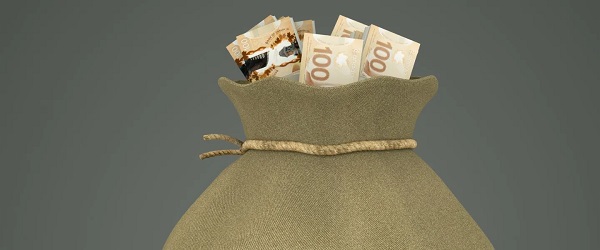
 Fraser Institute21 hours ago
Fraser Institute21 hours agoMétis will now get piece of ever-expanding payout pie
-
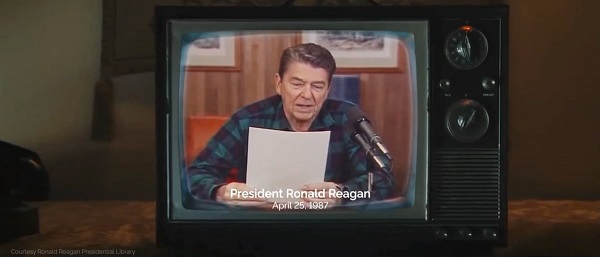
 Business2 days ago
Business2 days ago‘TERMINATED’: Trump Ends Trade Talks With Canada Over Premier Ford’s Ronald Reagan Ad Against Tariffs
-

 Business1 day ago
Business1 day agoTrump Admin Establishing Council To Make Buildings Beautiful Again
-
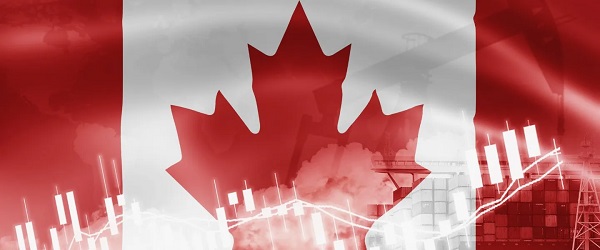
 Business19 hours ago
Business19 hours agoCarney government risks fiscal crisis of its own making





